- Home
- Patricia MacLachlan
Cassie Binegar
Cassie Binegar Read online
Dedication
For Ann, Dale, and Shulamith
—companions throughout the process—
Epigraph
One is beginning to learn
What the other is forgetting,
One preparing to go
Where the other has been,
And they feed each other
From kitchen chairs,
The space between
As clear as a sky beyond
Two branches, one tapering out,
The second, a nub of everything possible. . . .
Brendan Galvin
“Old Old Woman, Little Girl”
Atlantic Flyway
Contents
Dedication
Epigraph
1 Infinity
2 Day Dreams, Night Dreams
3 Inside, Outside
4 Gran
5 Wishes
6 Kaleidoscope
7 Feathers and Rhymes
8 Feet
9 Conversations
10 Questions and Answers
11 Cocoons
12 Catching Snow
13 Eyeglasses
14 The Lavender Dress
15 The Storm
16 Birds Across the Moon
About the Author
Back Ads
Other Books by Patricia MacLachlan
Credits
Copyright
About The Publisher
1
Infinity
CASSIE BINEGAR (whose name rhymes with vinegar) sat on a sand dune by the sea, being angry. I AM ANGRY, she wrote in big letters in the sand. “What’s written becomes truth,” her fourth-grade teacher had once said, and Cassie believed him. She carried a lined-white-paper list of complaints and angers, now numbering twenty-two and ranging from too many relatives to dry skin to this lonely place where she now lived. Cassie sighed and smoothed over the letters with a sweep of her hand and wrote I AM INFINITELY ANGRY. Cassie liked the word infinity. It was a big word with a big meaning. It was an i-n-f-i-n-i-t-e word.
A sea wind came up, and a tiny land crab walked sideways through the tail of the Y in INFINITELY. Cassie frowned and watched the sea. The sand and water stretched out as far as she could see. The spring sky, the color blue of her mother’s garden irises, was huge and cloudless. There were no neat fenced-in yards or sidewalks or boundaries in this new place. After one sand dune, there was another. After one wave, another came behind. Even the birds moved endlessly, the gulls wheeling above, the sanderlings darting before the waves below, always running just out of the way of the white curls of water. Cassie had tried running from the waves herself, but she was almost always caught by the water, sometimes in her good shoes.
The thought of shoes made Cassie frown again, for shoes had been one of the reasons they had moved to this lonely place.
“Can’t afford to shoe the family,” she had heard her father complain. “Boots for James, growing like sourweed. Boots and foul-weather gear for John Thomas. School shoes for Cassie.” And her parents had moved here to Snow Shore from their house inland. It was closer to her father and brothers’ fishing boat, and her mother could tend and rent the cottages that spread about the house like seeds sown from an apron.
Cassie turned her back on the sea and looked up at the new house. New house! It was old and gray and weathered, with only one scrub pine in the side yard—a tree so wind-wild and stunted that it didn’t even reach the roof. The garden was scattered, a clump of irises here, a nest of nasturtiums there, and beach plums and sea roses everywhere.
Cassie thought longingly of the order and pattern in her mother’s old garden inland. And her old tree house, built on the low limbs of a huge maple tree. It had been her space. Here there was no space for her. Even her own room was not hers. There was faded wallpaper—cabbage roses, her mother said—hung there by those who had lived there before. And there were worn places on the wooden floors that someone else had patterned.
In the beginning, when they had first come, the old attic had been Cassie’s space. There was a small round window there, and if Cassie lay on her stomach she could see the water, the sand, and the winding sea roads. She had arranged her books there—her dictionary, her thesaurus, and her notebooks—hidden from the rest of her family. She began her poem “Spaces” there.
Except for tops that spin
And books and poems
And my father’s grin,
I like spaces best of all.
Inside, outside, upsidedownside,
Narrow spaces where I can crawl.
She had searched through her dictionary for words to describe the new house. She had found three so far, all D words: dreary, depressing, decadent. She had become strangely content in her attic space. But soon, piece by piece, furniture and trunks and old suitcases tied with string took over the attic, moving her out.
Then Cassie found a door hidden under the back stairway, with a bare hanging light inside. She spent hours there, reading and writing.
Inside my house
Under a chair,
Behind a door
In my lion’s lair;
Pausing, whisperlike, on a stair,
I listen, hear, and stop to see,
And no one ever knows it’s me.
“Hush,” says my mother. “Is that a mouse?”
When it’s only me, hiding in my house.
But before Cassie could make this space her own, her older brothers and her father began to use it for their boots and fishing gear. Then the smell of the sea invaded and swept her away.
“Come out, come out, wherever you are,” called her laughing brothers, allowing her no privacy. And they pulled her into the kitchen, where they would spin another tale of a fish lost.
“Good!” Cassie would cry adamantly, her heart with the escaped fish.
“Another one for Cass,” her father would say, reaching over to take her hand. “Another Big Jim”—his name for every big fish that got away.
Cassie moved into each cottage then, one by one, taking her pen and notebook and books. The cottages were private and scattered, some hidden between grassy dunes, one high on a bluff so that Cassie could watch for the intruders that were her family. But slowly, her mother came behind her to scrape and paint and put up new curtains. “To get ready for the summer people next year,” she said.
“But I need a space!” cried Cassie. “A space of my own.”
Her mother, tall and lean and out of sorts, took her outside and waved her arm. “Cass, there’s space here. Space for everyone!”
But Cassie shook her head. It’s not my space, she thought.
Her new friend Margaret Mary lived in a shiny house that had lots of spaces for Margaret Mary. Cassie had visited her and seen that at least she fit in her family. She had neat braids and matching dresses and socks. She had a very neat dollhouse, neatly arranged, with matching sets of furniture. Even the doll’s toilet was in the doll’s bathroom. Cassie thought about her own secondhand dollhouse, passed down to her from now-old cousins, with its tumble of new and used furniture, just like Cassie’s house.
Margaret Mary’s mother was a proper mother, too. She did not wear her husband’s work shirts as Cassie’s mother did, or knit too-big sweaters and laugh at the mistakes and leave them in the sweater! Margaret Mary’s mother wore high-heeled shoes that made sharp clicking noises when she walked. You could always tell where she was and where she was going just by listening. She even had her canned goods in alphabetical order: artichoke hearts, broccoli, corn.
Margaret Mary’s father wore a neat suit and carried a black briefcase and came home at five-thirty every evening to give whoever stood by the front door a tidy kiss. Cassie’s father and brothers came home with the tides, smelli
ng of fish, and they’d whirl her up in their arms and touch her hello with rough, rope-worn hands.
“Am I adopted?” asked Cassie after visiting Margaret Mary’s house for the first time.
“Adopted!” Her mother laughed, pushing her long curly hair back with both hands. “We would have adopted you if we had known you. We’ve told you where you were born.”
“We never made it to the hospital with you,” her father said, his voice soft. “You were born in a taxi.”
“A taxi!” exclaimed Cassie. She told them about Margaret Mary, born in a city hospital with soft lights, hushed voices, and her father swooping (“swooping” was Margaret Mary’s word) into the room with an armful of roses.
“No roses,” said Cassie’s mother, putting her hand on her husband’s arm. “But your father raced through the crowd and bought a bunch of violets from a lady on the street corner.”
“Why didn’t he send the taxi driver?” grumped Cassie.
“Because the taxi driver was helping,” said her mother.
“Helping!” shrieked Cassie. “A stranger?”
“He’s not a stranger,” said her mother firmly. “We hear from him every year at Christmas.”
“If it’s swooping you want,” said her oldest brother John Thomas, “then swooping is what you’ll get.” And he whirled Cassie up in his arms, swinging her up and down and around. “Swoop!” he called. “Swoop, swoop, we are swooping your new baby to you, Madam.”
Cassie, furious, couldn’t help laughing as John Thomas deposited her in her mother’s lap.
“Lovely child,” announced James, smiling and peering at her. “But bald, I’m sad to tell. She looks like a soccer ball.”
“Don’t all babies?” asked John Thomas.
Alone on the dune staring at the house, Cassie touched her cheek. She could almost feel her mother’s coarse curly hair against her face, John Thomas’s rough hand holding hers, see the look of her father’s face, softened by the glow of the oil lamp, and James’ wide smile, his eyes crinkled by early crow’s-feet. A sudden breaking of the gulls overhead made Cassie look up. The gulls were like her family, noisy and raucous. There was always laughing and kissing and bumping and touching. Cassie winced, hunching her shoulders in protection against the thoughts of their loud love. She thought enviously of Margaret Mary’s mother, who looked serene. Cassie had practiced looking serene each morning before breakfast.
“What’s the trouble, Cass?” her mother had asked. “A headache?” She had brushed Cassie’s hair off her forehead and put her lips there. “A fever?”
Cassie shook her head, thinking of it. A great cloud—where had it come from?—slid over the sun, and Cassie shivered. Her mother came out of the house and called to her.
“Cass, time to set the table!”
Cassie stood up, watching the wind lift her mother’s long hair and push it in front of her face.
Sudden anger pushed at the back of Cassie’s throat.
“No,” she shouted suddenly. “I’m upset and angry. I don’t want to set the table. I don’t like it here. And I don’t like you much, either!”
But the wind, as Cassie had known it would, tossed the words back into her mouth. Her mother, not hearing, held out her arms and beckoned her home.
Cassie took out her lined-white-paper list, and while her mother waited she wrote one more complaint:
23. TOO MUCH INFINITY.
Then she sighed and slowly walked up the hill.
2
Day Dreams, Night Dreams
THE OLD MEMORY began again, even before dinner was over. Usually it came to Cassie as a dream, most often at night. But lately it came during the day, invading the safety of daylight. Cassie had made the dream go away before by pressing her fingers against her eyelids, tightly, so that waves and flashes came instead. But it didn’t work anymore. And today it was her mother’s fault. Right in the middle of dinner, in the midst of her brothers’ teasing, her father’s laughter, Cassie’s mother made the announcement.
“Gran’s coming for a while.”
Suddenly, for Cassie, all the noises stopped. She pushed her plate away and watched her father’s lips move.
“That’s good,” he said, looking up, his fork poised. “It will be good for her. She can help get the cottages ready.”
“The others would like to come, too,” added her mother. “They can all help. All right?” She bent her head to include the family in the decision.
“You mean Uncle Hat?” asked John Thomas, smiling broadly. “And Cousin Coralinda?”
“And Baby Binnie?” James began laughing. They all laughed. All but Cassie. The picture of her grandfather, Papa, lying in the big oak bed in the old house inland, came between Cassie and her family. And the memory came, washing over her like a sea wave.
“Come, come, Cassie,” Papa was saying as if it were yesterday. “Moving to the sea will be an adventure. There will be sand, miles of it, and the ocean and birds! And in the summers there will be people to rent the cottages. New people for you to know. Maybe new people each summer.” He held out his thin arms to hug her, but Cassie, as in every memory, as in every dream, shrugged him away. “No!” she said, stamping her foot stubbornly. “I don’t want to leave here. Something terrible will happen if we move. You’ll see. You’ll see!”
And soon after, something terrible had happened. Papa had died.
“Say you’re sorry for yelling,” Papa had called after her. “Say you’re sorry.”
But Cassie had run off.
“We can put them all up in the cottages,” came her mother’s voice. “As long as it stays this warm.”
I’m sorry, I’m sorry, thought Cassie. But as often as she tried to change the words, she had not said she was sorry. Would things have been different if she had? She had not gone to Papa’s funeral. She had stayed with a friend and watched out the window as the long line of cars passed by on their way to bury her grandfather. Seventeen. She had counted them as her friend played solitaire in the room.
“Twenty-five, thirty-five, forty,” said her friend, counting points to a game.
“Seventeen cars,” Cassie had answered her, her nose pressed against the window.
“Seventeen what?” asked James, nudging Cassie from her dream. And it was now again. Her Gran coming. Coming to stay. She would see, and Cassie would not be able to hide anymore.
“Seventeen nothing,” said Cassie, trying to smile at James.
Dinner was over, and Cassie’s mother was taking out her flute to play.
“Mom?” pleaded Cassie suddenly.
“Mom what?” asked her mother. She played a quick scale, a fluid sound like water calling down the side of a hill.
“Nothing,” said Cassie, the words she wanted to say gone the way of the music. “Nothing.”
She slipped out of her chair, taking her plate and her mother’s, and went to lean against the kitchen sink. The sweet sad sound of her mother’s flute made her throat tighten.
She had not seen Gran alone since the funeral, afraid that Gran, so good at seeing the truths behind Cassie’s words, might see the truth about Cassie. She had yelled at Papa. She was ashamed of her family. She wished for things to be different. No, she wished for things to be the same, the way they had been. Gran was coming, and she would see.
Cassie looked up and stared at the dark window over the sink.
“What do you see?” asked James, putting his arm around Cassie’s shoulders.
Cassie saw herself looking back, large eyed and wavery, like a ghost.
“Me,” said Cassie.
“Only you?” asked James. “There’s a moon on the water, can’t you see? And a boat out there. Look, she’s got her running lights on.” He bent down, his head next to Cassie’s, and pointed. Cassie closed her eyes and opened them again. She shook her head and tried to look beyond the staring face in the window glass. Behind them, Cassie’s mother began playing a quick piece, and Cassie could see her reflection get up and begin to
dance and weave around the room in time to the music. Cassie could see her wiggle and hear John Thomas and her father laugh.
Cassie sighed.
“Why can’t we be like everyone else?” she asked.
James looked down at her.
“And what is everyone else like, Cass?” he asked softly. He folded his arms, waiting. But there was no answer.
“You don’t understand,” said Cassie, angrily.
You don’t understand. Cassie thought of Margaret Mary and her family who wore shoes most times and had matching silverware. Margaret Mary liked Cassie. But now it would be ruined. Cassie’s relatives, Cassie thought, were even worse than her family. They would spoil everything. Uncle Hat, who often talked in numbers and rhymes. His daughter, Cousin Coralinda, who wore too many feathers, with her baby, Binnie. And worst of all, Gran, with her sharp eyes, quick, darting, like the sandpipers, and her blunt words.
Sighing, Cassie tried once more to look beyond the face in the glass. There was the sea out there, now black in the darkness, and a moon, and the every-so-often sweep of the Coast Guard light. But Cassie couldn’t see them. James was right. Her own face was in the way.
3
Inside, Outside
IN THE BEGINNING, Margaret Mary and Cassie had been careful friends, circling each other, making uneasy, measured reachings of friendship like dogs meeting for the first time. I know you’re a dog. I am, too. Sniff a bit. Will I like you? More important, will you like me? In school, where Cassie had come during the mid-year, there were others her age, all accepting, none unfriendly. But there was something about Margaret Mary, newly arrived from England. Something special in the mysterious prim set of her mouth that twitched up in a smile at odd times, the clipped way of speaking. Something special like a secret signal or a whisper or a flower suddenly blooming between two rocks. Margaret Mary was a comfortable mystery to Cassie. She listened to Cassie complain about her family, her house, her need for a space, her wish to go back. She listened and said little. And as Cassie drew comfort from Margaret Mary’s accepting silence, she basked in the order of Margaret Mary’s house. The tables were not cluttered with books and magazines. They were bare and shiny and you could not write messages in the dust. Margaret Mary’s mother and father discussed the morning newspaper and the evening news in soft voices that did not rise or fall with annoying enthusiasm. The conversation wafted above Cassie and Margaret Mary’s heads like steam from hot tea. Margaret Mary’s mother and father did not ask Cassie any embarrassing questions about what she thought and how she felt about things. They only asked her where she lived and if she had brothers and sisters and what her parents did for a living. Then she was left to think, and eat off the matching white plates with gold rims, dishes that were whisked away and put in a dishwasher. Cassie saw that the kitchen counters were shiny and unstained. The faucet did not drip. And there were no ants.

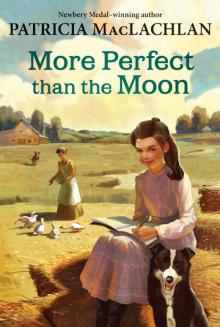 More Perfect Than the Moon
More Perfect Than the Moon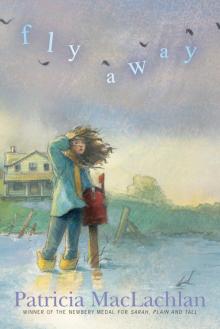 Fly Away
Fly Away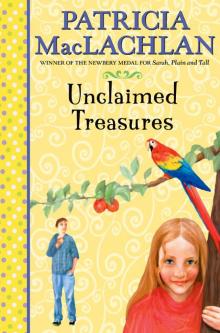 Unclaimed Treasures
Unclaimed Treasures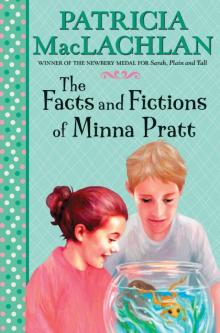 The Facts and Fictions of Minna Pratt
The Facts and Fictions of Minna Pratt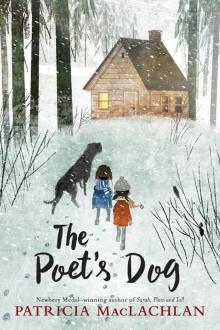 The Poet's Dog
The Poet's Dog Journey
Journey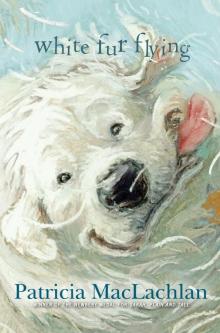 White Fur Flying
White Fur Flying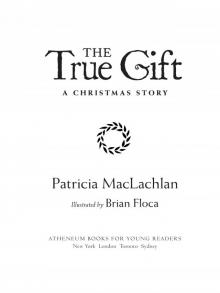 The True Gift: A Christmas Story
The True Gift: A Christmas Story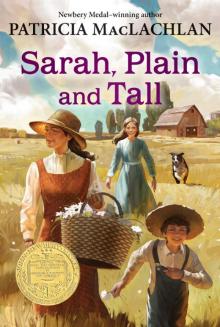 Sarah, Plain and Tall
Sarah, Plain and Tall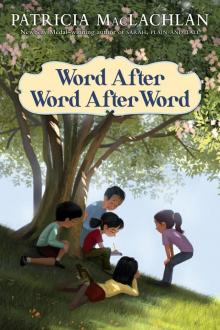 Word After Word After Word
Word After Word After Word Seven Kisses in a Row
Seven Kisses in a Row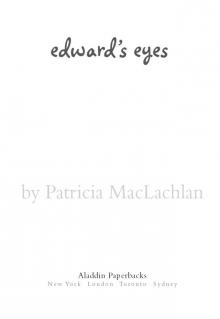 Edward's Eyes
Edward's Eyes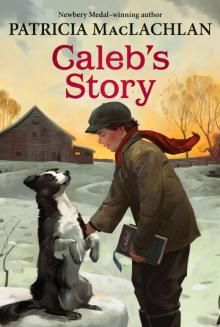 Caleb's Story
Caleb's Story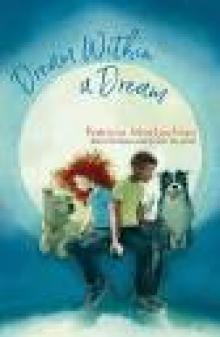 Dream Within a Dream
Dream Within a Dream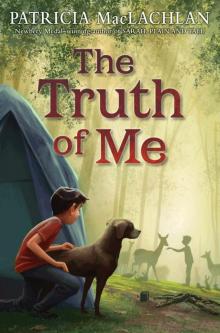 The Truth of Me
The Truth of Me Wondrous Rex
Wondrous Rex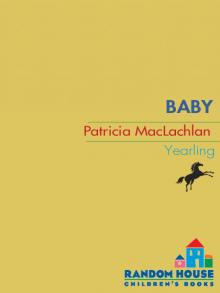 Baby
Baby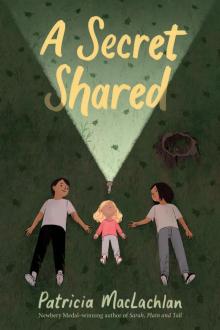 A Secret Shared
A Secret Shared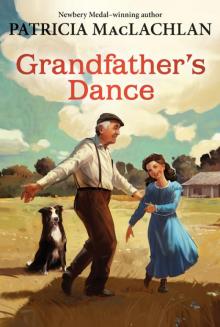 Grandfather's Dance
Grandfather's Dance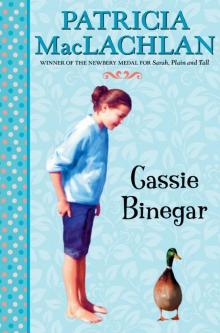 Cassie Binegar
Cassie Binegar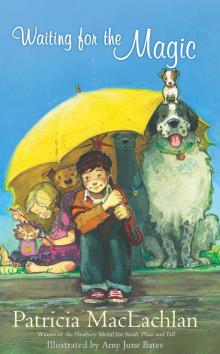 Waiting for the Magic
Waiting for the Magic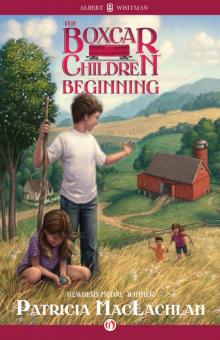 The Boxcar Children Beginning
The Boxcar Children Beginning My Father's Words
My Father's Words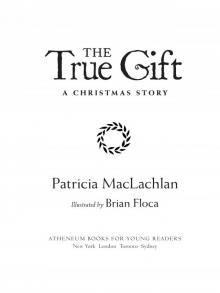 The True Gift
The True Gift